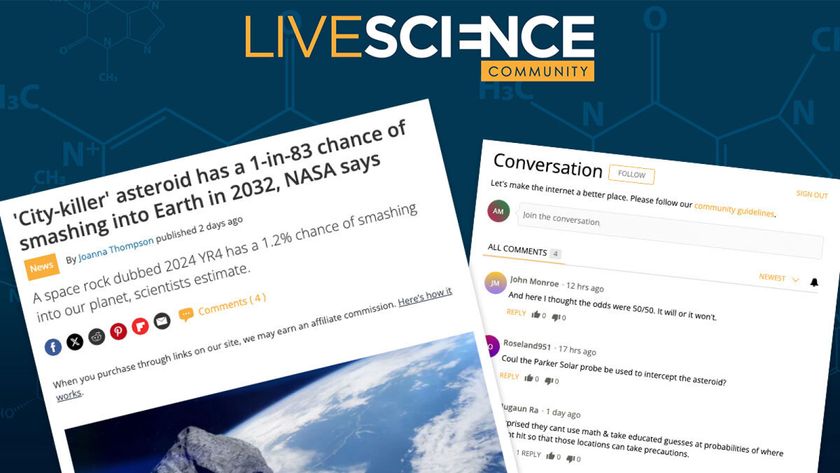Sex, Lies and Weiner: Why They Don't Think They'll Get Caught
A Twitter photo sent by Rep. Anthony Weiner of his underwear-clad crotch has the Web abuzz with talk of his survival in the political realm, but taking a step into his psyche may clear up a perhaps more boggling question: Why would he make such a seemingly stupid mistake, especially in light of the long list of celebs and politicians who have been caught in the past for their sexual transgressions?
Weiner, a Democrat from New York, admitted this week he had sent the photo, meant for a woman in Washington, to all his Twitter followers. His teary-eyed confession may seem all too familiar, with similar public confessions made recently by former California Gov. Arnold Schwarzenegger in May, and in 2009 by golf champ Tiger Woods, talk show host David Letterman, former Sen. John Edwards and former South Carolina Gov. Mark Sanford.
So what was Weiner thinking? Perhaps he wasn't actually thinking consciously about his acts, scientists say.
"I don't think that people really take into account an accurate sense of just how risky a text message or a little picture is," said Daniel Kruger, evolutionary psychologist at the University of Michigan. "There are probably a hundred different things they're doing in their day."
And even if Weiner had thought about the risk he was taking, he'd likely not expect to get caught. High-profile philanderers have so much power and control in their lives they couldn't imagine not having that control over their personal doings as well. Add greater opportunities to cheat and the urge to spread their genes into the mix, and extramarital affairs (or photo-sharing) may be par for the course. [10 Most Destructive Human Behaviors]
One psychologist offers another view on the politicians and cheating question. He suggests that rather than the job upping the chance of affairs, it's the type of person who goes into the field, someone who loves to take risks and seeks out such thrills.
On a mission
Sign up for the Live Science daily newsletter now
Get the world’s most fascinating discoveries delivered straight to your inbox.
Certain personality traits, along with sexual desire, may cause a guy like Weiner to follow in the errant footsteps of other politicians.
"They tend to have narcissistic personalities, with weak superegos that would [otherwise] stop them from acting out their impulses," said anthropologist and psychoanalyst Michael Maccoby. "Some of them are excited by flirting with danger," said Maccoby, who is president of the Maccoby Group, a consulting firm based in Washington, D.C.
And then there's sex. "Seeing other examples apparently doesn’t stop people from doing it," Kruger told LiveScience. "Especially since we know this guy was thinking about sex at the time, he was aroused, that would make him even more likely to take a risk like this."
Past research has shown that men increase their risk-taking — from walking across the street outside a crosswalk to risking more money in gambling games — when an attractive woman is around.
From an evolutionary perspective, men are here to sow their seeds, so a sexual transgression here and there would make sense. They desire more sexual partners, and even lower their standards when it comes to one-night stands, studies have shown.
"The ultimate currency here is reproductive success and if there's an opportunity for sex that is a goal that is worthy of such a risk," Kruger said.
In fact, our male ancestors who were at the top of the hierarchy would've enjoyed a much greater share of reproductive benefits, Kruger noted. Even in our "supposedly monogamous society," Kruger said, men are more likely than women to remarry after divorce.
This evolutionary urge, combined with modern technology that lets a person send off a note or photo to anyone in the ether, takes such risk-taking to a new level.
"I don't think he anticipated this would happen," Kruger said during a telephone chat. "He was just flirting with one person and it got out of his pants and onto the World Wide Web."
As it turns out, a lewd digital photo is considered cheating. Preliminary results of Kruger's research show that on a scale of 0 to 100, with 100 being "definitely cheating," emailing a naked photo of oneself scored 88, and texting an erotic message scored 83. (Vaginal intercourse scored 98.)
Power illusions
Power can also lead to illusions of control and invincibility.
"They think they are special, not subject to the rules that constrain others," Maccoby wrote in an email to LiveScience, referring to politicians. "However, it's usually the case that they get away with breaking the rules and start to think they are invulnerable."
Frank Farley, a psychologist at Temple University and former president of the American Psychological Association, doesn't buy the idea that power and narcissism are behind these cheating behaviors. Rather his research suggests risk-takers are the people who are attracted to, and thrive in, the political realm.
Think about it, Farley said during a telephone interview, there's no job security (one wrong word or vote can get you booted out of office), there's lots of novelty (constantly meeting new people and traveling to new places), and just uncertainty in general (for instance any interview or speech you give means answering tough questions on the fly). A politician career is "tailor-made" for risk-takers, who are also thrill-seekers, he said.
"They believe that they can control their fate and so they do it," Farley said of politicians cheating. "It's a very extreme form of risk-taking given the fishbowl existence they have and the public eyes are always there."
And while celeb-types have more opportunities to cheat, no solid estimates are out there on the prevalence of cheating in politicians and celebrities compared with the general population. But overall, studies have shown that in the general population, 30-60 percent of American men and 20-50 percent of American women have had at least one extramarital affair.
Follow LiveScience for the latest in science news and discoveries on Twitter @livescience and on Facebook.
Jeanna Bryner is managing editor of Scientific American. Previously she was editor in chief of Live Science and, prior to that, an editor at Scholastic's Science World magazine. Bryner has an English degree from Salisbury University, a master's degree in biogeochemistry and environmental sciences from the University of Maryland and a graduate science journalism degree from New York University. She has worked as a biologist in Florida, where she monitored wetlands and did field surveys for endangered species, including the gorgeous Florida Scrub Jay. She also received an ocean sciences journalism fellowship from the Woods Hole Oceanographic Institution. She is a firm believer that science is for everyone and that just about everything can be viewed through the lens of science.
Most Popular






